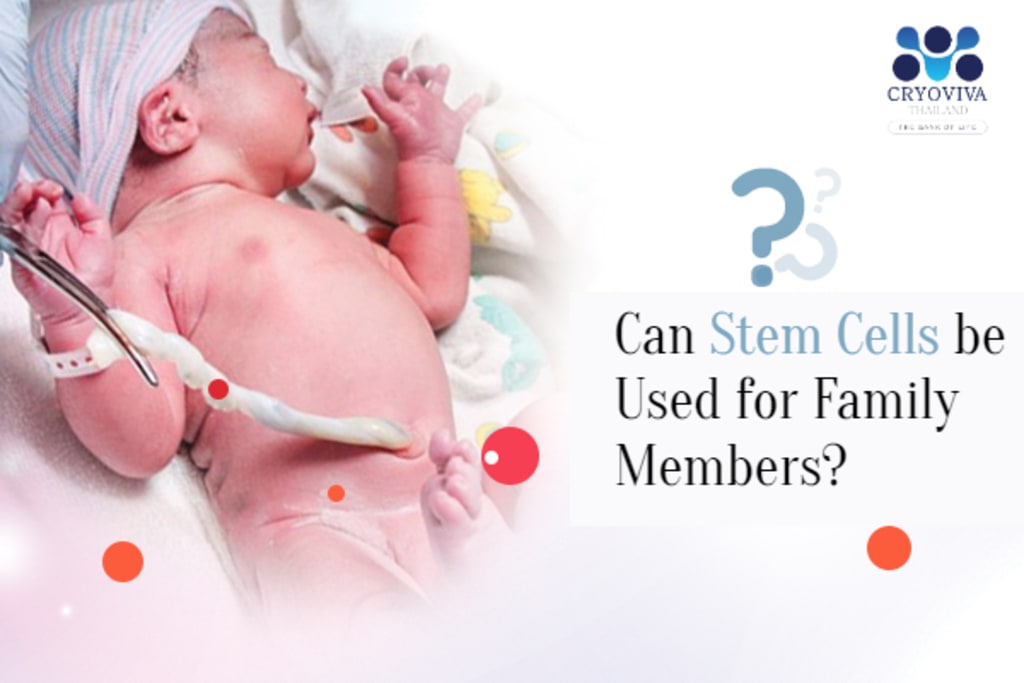Can Stem Cells be Used for Family Members?
Stem cells hold great promise in treating a variety of diseases and in some cases, they can be used for family members. This article explores the potential uses and limitations of stem cell therapy for family members including the different types of stem cells and the ethical considerations involved

A stem cell transplant substitutes healthy blood cells for damaged ones. It may help treat blood cell disorders such as leukaemia and lymphoma. Stem cells are unique cells created by bone marrow (the spongy substance located inside certain bones) that may differentiate into several blood cell types.
They can develop into one of three kinds of blood cells:
- The body's red blood cells carry oxygen around in them
- Whereas white blood cells combat illness
- Platelets, which assist in stopping bleeding
A stem cell transplant is a stem cell therapy that entails destroying harmful blood cells and replacing those cells with stem cells extracted from the blood or bone marrow. Similar stem cells cannot be transplanted with all the family members until and unless it matches their tissue type.
Read also: Stem Cell Therapy for Type 1 Diabetes
There are two main types of stem cells: embryonic stem cells and adult stem cells. Embryonic stem cells are derived from embryos and have the potential to become any type of cell in the body. Adult stem cells, on the other hand, are found in various tissues throughout the body and can only develop into certain types of cells.
Why Are Stem Cell Transplants Performed?
Stem cell transplants treat diseases in which the bone marrow has been damaged and can no longer produce healthy blood cells. Transplants can also restore blood cells injured or killed by aggressive cancer treatment.
The following conditions can be treated by stem cell therapy:
- Aplastic Anaemia Severe (bone marrow failure)
- Leukaemia & lymphoma (forms of cancer that affect white blood cells)
- Multiple Myeloma (cancer that damages plasma cells)
- Blood, immune system, and metabolic illnesses such as sickle cell anaemia, thalassaemia, severe combined immunodeficiency (SCID), and Hurler syndrome
A stem cell transplant is normally performed only when previous therapies have failed, the potential advantages of the transplant exceed the dangers, and you are in reasonably excellent health despite your underlying ailment.
Stem cell transplants are performed for a variety of reasons, primarily to treat diseases or conditions that affect the blood or immune system. Stem cells are specialized cells that have the potential to develop into many different types of cells in the body.
What Happens During a Stem Cell Transplant?
Stem cell use involves transferring healthy stem cells from one person's blood or bone marrow to another, ideally a close relative with the same or a comparable tissue type. It is referred to as an allogeneic transplant. On the other hand, an autologous transplant is a process where the healthy blood stem cells are taken out and stored and later used by the same person for transplant. There are 5 basic phases in a stem cell transplant, which are as follows:
- Test: It is conducted to determine your general state of health.
- Harvesting: It is the procedure of gathering stem cells from your body or a donor's body to be utilized in the transplant.
- Conditioning: Chemotherapy or radiation therapy is used as a conditioning treatment to get your body ready for the transplant.
- Transplant: The stem cells are transplanted.
- Recovery: It often takes a few weeks in the hospital for the transplant to start working, and it may take about a year to recover completely.
Read also: How Can Stem Cells Treat Cancer?
Stem cell transplantation, also known as bone marrow transplantation, is a medical procedure in which damaged or diseased stem cells are replaced with healthy ones. The stem cells can be obtained from a donor, or the patient's own stem cells can be used if they were collected and stored beforehand.
Stem Cell Transplant from Relatives
Based on human leukocyte antigen (HLA) tissue type, a match-finding test will be conducted between you and your relative. HLA typing is a significant component of your unique genetic makeup and helps find out the cells that belong in your body and don't. Blood types and HLA types are similar, although HLA types are far more varied. It would help if you had a tissue type that matches your relative to be a donor; however, matching blood groups is not required.
Numerous genes make up your HLA type, but six are particularly important for matching. Each has two distinct variations, or alleles, making a total of twelve. Your mother's and father's variations are passed down to you. When it comes to finding a donor for you, an 11/12 match occurs when 11 of these genes match. If all 12 genes are matches, you have a 12/12 matching HLA.
A brother or sister, or perhaps another immediate family member, has the highest chance of finding a match. Thus, stem cells can be used for family members sharing the same HLA, most likely siblings with the same parents.
It is important to note that stem cell transplantation is a complex medical procedure that requires careful consideration and evaluation by medical professionals. The decision to use stem cells from a family member should be made in consultation with a physician and based on a thorough evaluation of the risks and benefits of the procedure.
Wrapping Up
Cryoviva Biotech Private Limited is the top choice for parents to bank their child's cord blood. More than 3 lakh parents have chosen us as their stem cell bank in India. Our goal is to attain organisational excellence by fostering the proper viewpoint within our team and providing world-class development, innovation, and improvement possibilities. Contact us today!
About the Creator
Avatantika Singh
I am Avantika Singh working at Cryoviva and a health care blogger and also gives information about stem cell preservation in India. Cryoviva Biotech is a company in India that offers stem cell preservation services in India.






Comments
There are no comments for this story
Be the first to respond and start the conversation.